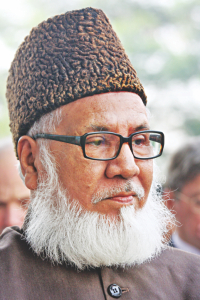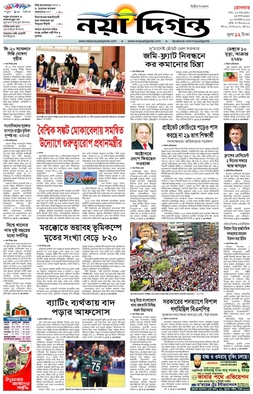
Ghulam Azam was a Bangladeshi Islamist politician. He was the former leader of Bangladesh Jamaat-e-Islami, the largest Islamist political party in Bangladesh.

Motiur Rahman Nizami was a politician, former Minister of Bangladesh, Islamic scholar, writer, and the former leader of the Bangladesh Jamaat-e-Islami. He is noted for leading the terror squad Al-Badr during the Bangladesh Liberation War. On 29 October 2014, he was convicted of masterminding the Demra massacre by the International Crimes Tribunal of Bangladesh. Nizami was the Member of Parliament for the Pabna-1 constituency from 1991 to 1996 and again from 2001 to 2006. He also served as the Bangladeshi Minister of Agriculture and Minister of Industry.
The Razakar was an East Pakistani paramilitary force organised by General Tikka Khan in then East Pakistan, now called Bangladesh, during the Bangladesh Liberation War in 1971. The force committed war crimes during the war including massacring civilians, looting, and rape.
The Al-Badr was a paramilitary force composed mainly of Bihari Muslims which operated in East Pakistan against the Bengali nationalist movement during the Bangladesh Liberation War, under the patronage of the Pakistani government.

Ali Ahsan Mohammad Mojaheed was a Bangladeshi politician who served as a Member of Parliament and as the Minister of Social Welfare from 2001 to 2007. He was executed in 2015 for war crimes committed during the 1971 Liberation war of Bangladesh.

Shahriyar Kabir is a Bangladeshi journalist, filmmaker, human rights activist, and author of more than 70 books focusing on human rights, communism, fundamentalism, history, and the Bangladesh war of independence. He was awarded Bangla Academy Literary Award in 1995.

The Daily Naya Diganta is a Bengali daily newspaper published in Bangladesh since 2004.

Bangladesh Jamaat-e-Islami, previously known as Jamaat-e-Islami Bangladesh, or Jamaat for short, is the largest Islamist political party in Bangladesh. On 1 August 2013, the Bangladesh Supreme Court cancelled the registration of the Jamaat-e-Islami, ruling that the party is unfit to contest national elections.
Chowdhury Mueen-Uddin, is a British citizen convicted of war crimes committed during the Bangladesh Liberation War which involved the murder of Bengali intellectuals in collaboration with the Pakistan Army. After the liberation of Bangladesh, Chowdhury escaped from Bangladesh and attained British citizenship. Bangladesh has yet to file a request with the UK government to bring back Mueen, and the two countries do not have any extradition treaty signed between them.

The International Crimes Tribunal (Bangladesh) (ICT of Bangladesh) is a domestic war crimes tribunal in Bangladesh set up in 2009 to investigate and prosecute suspects for the genocide committed in 1971 by the Pakistan Army and their local collaborators, Razakars, Al-Badr and Al-Shams during the Bangladesh Liberation War. During the 2008 general election, the Awami League (AL) pledged to try war criminals. The government set up the tribunal after the Awami League won the general election in December 2008 with a more than two-thirds majority in parliament.
Abul Kalam Azad was a former Bangladeshi politician of the Jamaat-e-Islami, televangelist and convicted war criminal of the Bangladesh liberation war.

Abdul Quader Mollah was a Bangladeshi Islamist leader, writer, and politician of the Bangladesh Jamaat-e-Islami, who was convicted of war crimes and sentenced to death by the International Crimes Tribunal, Bangladesh (ICT) set up by the government of Bangladesh and hanged. The United Nations raised objections to the trial's fairness, while the general public in Bangladesh widely supported the execution.

On 5 February 2013, protests ignited in Shahbagh, Bangladesh, fueled by the call for the execution of the convicted war criminal and Islamist Abdul Quader Mollah. Previously sentenced to life imprisonment, Mollah was convicted on five of six counts of war crimes by the International Crimes Tribunal of Bangladesh. Mollah supported the West Pakistan during the 1971 Bangladesh Liberation War and played a crucial role in the murder of numerous Bengali nationalists and intellectuals. The demonstrations also sought the government's ban on the radical right-wing and conservative-Islamist group, Jamaat-e-Islami from participating in politics, including elections, and a boycott of institutions supporting or affiliated with the group.

On 28 February 2013, the International Crimes Tribunal sentenced Delwar Hossain Sayeedi, the vice-president of the Jamaat-e-Islami to death for war crimes committed during the 1971 Bangladesh Liberation War. Following the sentence, activists of Jamaat-e-Islami and its student wing Islami Chhatra Shibir attacked Hindus in different parts of the country. Hindu properties were looted, Hindu houses were burnt into ashes and Hindu temples were desecrated and set on fire. While the government has held the Jamaat-e-Islami responsible for the attacks on minorities, the Jamaat-e-Islami leadership has denied any involvement. Minority leaders have protested the attacks and appealed for justice. The Supreme Court of Bangladesh has directed law enforcement to start suo motu investigation into the attacks. The US Ambassador to Bangladesh expressed concern about attacks by Jamaat on the Bengali Hindu community.
2013 Bangladesh violence refers to the political instability, increase in crime and widespread attacks of minorities and opposition activists.

The movement demanding trial of war criminals is a protest movement in Bangladesh, from 1972 to present demanding trial of the perpetrators of 1971 Bangladesh genocide during the Bangladesh Liberation War from Pakistan.

Mir Quasem Ali was a Bangladeshi businessman, philanthropist and politician. He was a former director of Islami Bank, and chairman of the Diganta Media Corporation, which owns Diganta TV. He founded the Ibn Sina Trust and was a key figure in the establishment of the NGO Rabita al-Alam al-Islami. He was considered to be the wealthiest member of the Bangladeshi political party Jamaat-e-Islami. He was sentenced to death on 2 November 2014 for crimes against humanity committed during the Liberation War of Bangladesh in 1971 by International Crimes Tribunal of Bangladesh. The charges were denied by his relatives, stating they were politically motivated. Rights groups also raised concerns about these cases, with Amnesty International criticising the use of the death penalty and saying Mir Quasem Ali's trial had been unfair. He was hanged at Gazipur on 3 September 2016 after his final appeal was rejected by the Supreme Court of Bangladesh.
Khondakar Abu Taleb (1921-1971) was a Bangladeshi journalist who was killed by Pakistani Army in the Bangladesh Liberation and is considered a "martyr" in Bangladesh.
The Sohagpur massacre was a mass killing of 187 civilians on 25 July 1971 in the Mymensingh District of East Pakistan during the Liberation War. The massacre was perpetrated by the Pakistan Army and Al-Badr, a paramilitary force opposing Bangladeshi independence. Following the massacre, Sohagpur became known as the "village of widows."











